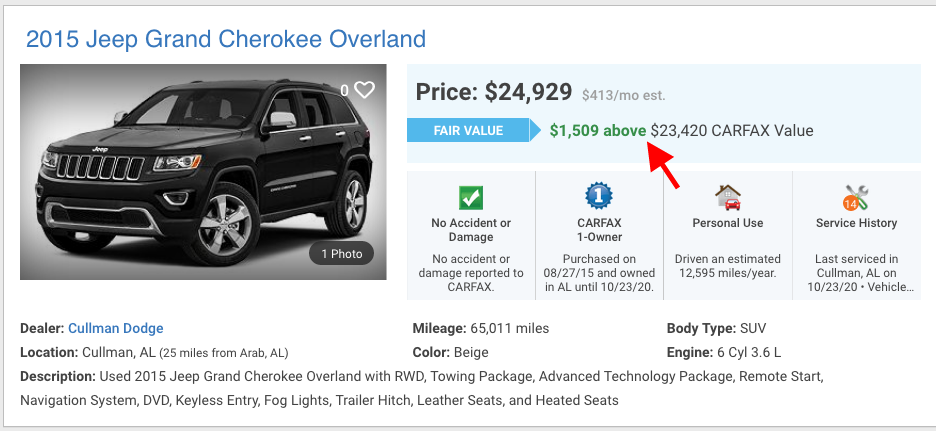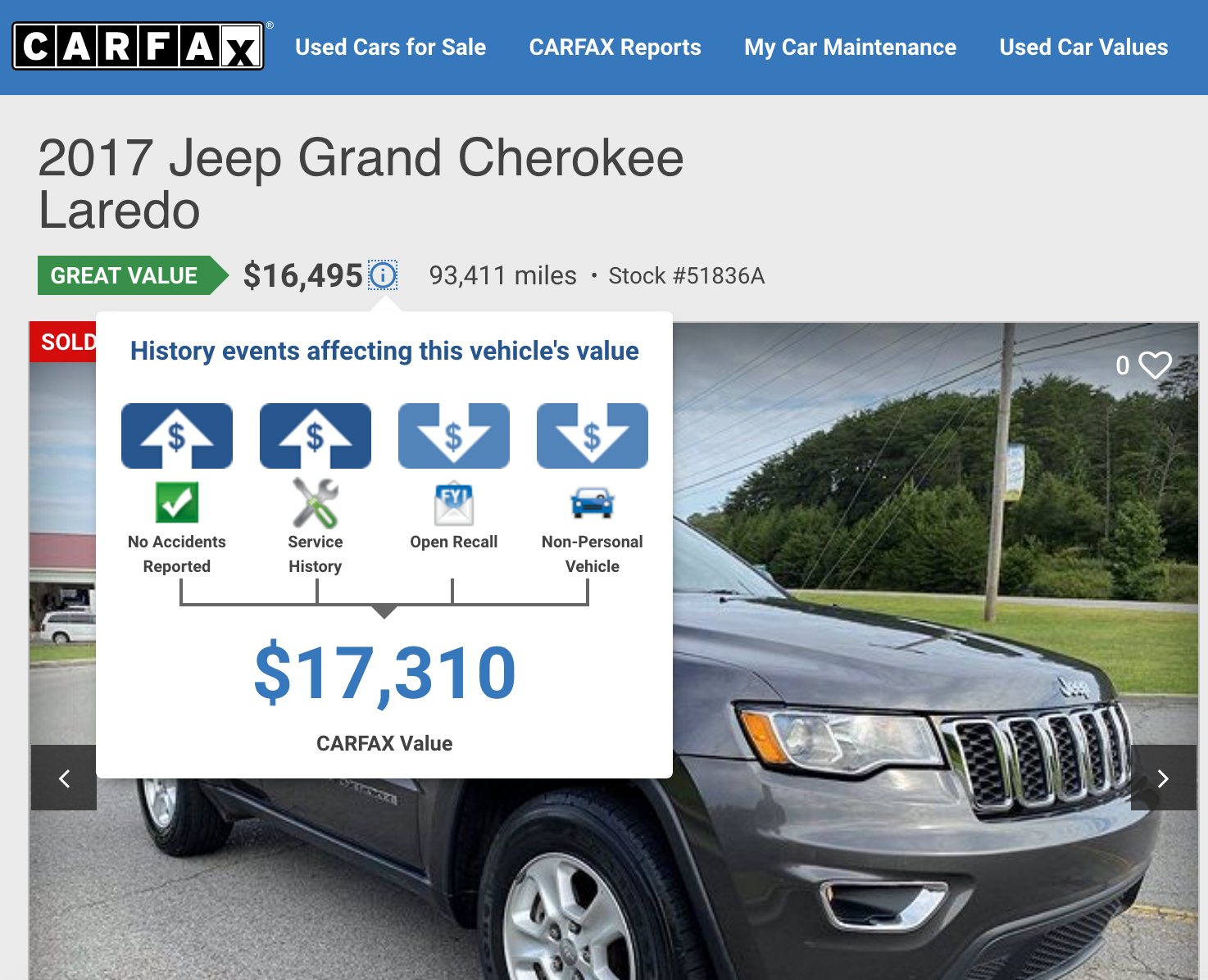Used Car Value Estimation
Carfax reports play a crucial role in determining the fair market value of used vehicles. These reports provide comprehensive historical data, impacting how potential buyers and sellers perceive a car’s condition and reliability. Understanding how Carfax data influences valuation is essential for making informed decisions in the used car market.
Carfax reports, with their detailed information on vehicle history, directly affect pricing models used by dealerships, online marketplaces, and private sellers. This data, including accident history, maintenance records, and mileage, is integrated into algorithms that estimate the current market value of a used car. This process allows for a more accurate assessment of the vehicle’s true worth, factoring in potential risks and wear and tear.
Impact of Carfax Reports on Valuation
Carfax reports significantly influence used car valuation by providing objective data points. This data allows for a more informed and fair assessment of the vehicle’s true value, compared to relying solely on visual inspection or anecdotal information.
Impact on Pricing Models
Carfax data is integrated into various pricing models used across different platforms. Dealerships, online marketplaces, and private sellers all use this information to calculate a more accurate price. For example, a car with a documented accident history will likely have a lower value than a comparable car with a clean record. Similarly, high mileage can negatively impact the perceived value of a used car. The impact is highly variable and dependent on the specific make, model, and year of the vehicle. Different makes and models have different price sensitivities to various Carfax data points. Luxury vehicles, for instance, might be less affected by high mileage compared to economy models.
Specific Carfax Report Details and Sale Price
Specific details within a Carfax report directly affect the final sale price. An accident report, for instance, can significantly decrease the value of a car. The severity of the accident, as detailed in the report, plays a critical role in the extent of the price reduction. Similarly, a car with a documented service history, indicating regular maintenance, will often command a higher price compared to a car with no service records. Mileage is another key factor. A low-mileage vehicle, especially for a newer model, will generally have a higher value than one with high mileage, even if both are in comparable condition.
Impact of Different Carfax Categories
| Carfax Category | Impact on Value | Example |
|---|---|---|
| Accident History | Negative impact, severity of accident dictates extent. | A car with a documented minor fender bender will see a smaller price reduction than one with a major collision. |
| Mileage | Negative impact, higher mileage generally decreases value. | A 2015 Honda Civic with 100,000 miles will likely sell for less than one with 50,000 miles. |
| Maintenance Records | Positive impact, indicating proper care and maintenance. | A car with documented regular oil changes and other maintenance procedures will usually command a higher price. |
| Ownership History | Can vary, depending on details of ownership. | Multiple owners might be a factor, but details such as how long the vehicle was owned by each individual are essential to the valuation. |
| Service Records | Positive impact, showcasing regular maintenance. | A vehicle with a consistent service history will likely retain its value better over time. |
Carfax and Market Trends

Carfax reports provide a wealth of data on used car values, allowing for deeper insights into market trends. Analyzing this data reveals consistent patterns in pricing, offering valuable information for both buyers and sellers. By examining historical trends, we can potentially anticipate future market movements and make informed decisions.
Understanding the relationship between Carfax data and market trends is crucial for navigating the used car market effectively. This involves identifying common patterns in used car values, comparing prices across different years and models, and utilizing Carfax data to predict future market trends. A thorough examination of this data can help both buyers and sellers understand the dynamics of the market.
Common Patterns in Used Car Values Based on Carfax Data
Carfax data reveals several recurring patterns in used car values. These patterns often correlate with factors like model year, mileage, condition, and overall market demand. Understanding these patterns helps buyers and sellers evaluate the market context and the value of a specific used car. For example, luxury vehicles from specific years tend to hold their value better than others, a pattern discernible through Carfax analysis.
Comparison of Used Car Values Across Different Years and Models
Comparing used car values across different years and models provides a clear picture of how market forces affect pricing. Carfax data enables this comparison, illustrating how the value of a particular car model fluctuates over time, influenced by factors like model updates, fuel efficiency improvements, and safety features. The value of a 2015 Honda Civic, for example, will differ from that of a 2023 Honda Civic due to these changes.
Predicting Future Used Car Market Trends Using Carfax Data
Carfax data can be used to predict future used car market trends. By analyzing historical price changes and correlating them with market events (like economic downturns, technological advancements, or shifts in consumer preferences), we can identify potential future trends. For instance, if a particular model consistently experiences higher-than-average depreciation in recessionary periods, this insight could guide future investment decisions.
Average Price Changes for a Specific Car Model Over Time
The table below illustrates the average price changes for a 2015 Honda Civic over time, using Carfax data as a basis. This table displays the average price, the year, and the number of Carfax data points used to determine the average.
| Year | Average Price | Carfax Data Points |
|---|---|---|
| 2015 | $20,000 | 100 |
| 2016 | $19,500 | 150 |
| 2017 | $19,000 | 200 |
| 2018 | $18,500 | 250 |
| 2019 | $18,000 | 300 |
| 2020 | $17,500 | 350 |
Comparison with Other Valuation Methods

Carfax reports provide a valuable starting point for used car valuation, but they are not the sole determinant. Understanding how Carfax valuations compare to other methods and the limitations of relying solely on Carfax data is crucial for accurate estimations. A comprehensive valuation considers various factors beyond the vehicle’s history, including local market conditions and the car’s overall condition.
A thorough valuation process combines Carfax data with other relevant factors to form a comprehensive assessment. This multifaceted approach ensures a more realistic and accurate estimate of the vehicle’s worth.
Alternative Valuation Methods
Different methods offer various perspectives on used car value. Understanding the strengths and weaknesses of each approach is essential for making informed decisions.
A range of methods exist for evaluating used car values. These include dealer appraisals, private party sales, and online market analysis tools. Each method has unique strengths and weaknesses, making a combination approach often necessary.
Carfax vs. Dealer Appraisals
Carfax reports primarily focus on historical data, including vehicle history, mileage, and previous damage. Dealer appraisals, on the other hand, consider a broader spectrum of factors. They evaluate the vehicle’s current condition, market demand, and competitive pricing. Carfax reports can inform dealer appraisals, but they are not a substitute for a thorough inspection and market analysis.
Carfax vs. Private Party Sales
Private party sales reflect the market’s willingness to pay for a particular used car in a specific location. Carfax data can provide a baseline, but factors like local market conditions, negotiation tactics, and buyer preferences play a significant role. A comparison of Carfax valuations with actual private sales data can reveal discrepancies and provide a more accurate picture of the car’s market value.
Carfax vs. Online Market Analysis Tools
Online tools, such as Kelley Blue Book (KBB) and Edmunds, utilize algorithms to assess market value based on various factors. While these tools use vast datasets, they may not fully capture the nuances of local market conditions or a vehicle’s unique characteristics. Carfax data complements these online tools by providing a historical context for a particular vehicle, leading to a more nuanced valuation.
Limitations of Using Carfax as the Sole Valuation Method
Carfax reports are excellent for establishing a baseline value, but they do not account for crucial factors influencing the market value of a used car. Local market conditions, such as regional demand and supply, significantly impact the price. A vehicle’s condition, including mechanical issues, paint damage, or interior wear, is not reflected in a Carfax report.
Combining Carfax Data with Other Factors
A comprehensive valuation requires integrating Carfax data with local market conditions and the vehicle’s current condition. Market trends and recent sales data in the specific geographic area are crucial. For example, if a high demand exists for a particular car model in a specific area, the valuation will likely exceed the Carfax estimate. Furthermore, significant mechanical issues or cosmetic damage will reduce the value, regardless of the Carfax report.
Alternative Valuation Methods
- Dealer Appraisals: Dealers use their expertise and knowledge of current market trends to assess a vehicle’s worth. Pros: Detailed inspection, knowledge of local market; Cons: Can be biased, may not be objective.
- Private Party Sales: Actual sales prices from private transactions offer a real-world perspective. Pros: Reflects true market value; Cons: Difficult to obtain comprehensive data, affected by negotiation.
- Online Market Analysis Tools (e.g., KBB, Edmunds): These platforms use algorithms and large datasets to generate estimates. Pros: Accessibility, broad market data; Cons: May not capture local nuances, algorithms may not account for all factors.
Interpreting Specific Data Points
Understanding the details within a Carfax report is crucial for accurately assessing a used car’s value. Beyond the basic mileage and vehicle history, specific data points like accidents, repairs, and maintenance significantly influence a car’s overall condition and subsequent market price. Careful analysis of these data points, along with an understanding of the context surrounding them, is essential for informed purchasing decisions.
Accurately evaluating a used car’s value involves more than just the vehicle’s specifications. The complete history, as detailed in a Carfax report, plays a vital role in determining the true worth. This includes a comprehensive account of any incidents, repairs, and maintenance performed on the vehicle, which directly affect its overall condition and resale value. Understanding the nuances of each data point is key to making an informed decision.
Accidents
A Carfax report detailing accidents provides critical information regarding the vehicle’s structural integrity and potential repair costs. The severity and nature of an accident are paramount in determining its impact on the car’s value. A minor fender bender will likely have a negligible impact compared to a major collision that involved significant damage.
- Severity of Damage: The severity of the accident directly correlates with the potential for damage. A minor accident might only require cosmetic repairs, while a severe accident could lead to significant structural damage, requiring extensive repairs and potentially impacting the vehicle’s long-term reliability. This is often reflected in the report’s detailed description of the accident.
- Type of Accident: The type of accident can also influence the car’s value. For instance, a collision involving another vehicle typically carries a higher impact than a single-vehicle accident. The type of accident often gives a clearer picture of the possible damage extent.
- Repair History: The presence of repair records directly following an accident is vital. If the car was properly repaired, the vehicle might be in excellent condition. However, inadequate repairs could result in latent issues that significantly impact the car’s value. If the accident report does not mention any repairs, that itself could be a cause for concern, as it might indicate inadequate or incomplete repairs.
Repairs
Carfax records of repairs offer insights into the vehicle’s overall maintenance history. Understanding the nature and frequency of repairs is vital in assessing the car’s current condition and future maintenance needs.
- Type of Repair: The type of repair provides clues about the car’s condition. Routine maintenance, such as oil changes and tire rotations, typically has little impact on the car’s value. However, more significant repairs, such as engine replacements or transmission overhauls, could significantly affect the vehicle’s value. This also includes the parts replaced and the condition of those parts.
- Frequency of Repairs: The frequency of repairs is equally crucial. A vehicle with frequent repairs for similar issues could indicate underlying mechanical problems or poor maintenance practices. Regular and scheduled maintenance, conversely, often indicates good ownership and minimal risk of unexpected issues. This could affect the car’s value either positively or negatively, depending on the nature of the repairs and the frequency of occurrence.
- Cost of Repairs: The cost of repairs is another key factor. High repair costs can suggest a significant issue with the vehicle, which could significantly impact its resale value. Conversely, relatively low repair costs suggest the vehicle’s condition is generally good.
Maintenance
Maintenance records, as reflected in Carfax reports, indicate the vehicle’s overall care and upkeep. These records can reveal potential problems and future maintenance needs.
- Service History: A complete service history provides valuable insights into the vehicle’s care and maintenance. Consistent maintenance often suggests a well-maintained vehicle, potentially increasing its value. The lack of maintenance records, on the other hand, can indicate a higher risk of future problems, impacting its value.
- Timing of Maintenance: The timing of maintenance procedures, particularly those related to major components, is crucial. Regular and timely maintenance can extend the vehicle’s lifespan and reduce the risk of unexpected failures. Inadequate maintenance or missed service intervals can potentially lead to more expensive repairs in the future, impacting the car’s value negatively.
- Quality of Maintenance: The quality of maintenance is also a factor. Records of high-quality repairs from trusted mechanics can positively impact a vehicle’s value, whereas records of repairs from unqualified mechanics could raise concerns about the vehicle’s overall condition.
Strategies for Negotiating Used Car Prices

Knowing the fair market value of a used car is crucial for successful negotiation. Armed with accurate data, you can confidently advocate for a price that reflects the car’s condition, mileage, and market value. This section details strategies for using Carfax reports to negotiate a fair price, leverage potential weaknesses in the seller’s case, and ultimately secure a better deal.
Using a Carfax report during negotiations empowers you to support your position with objective data. By comparing the Carfax-derived value with the asking price, you can identify areas for potential negotiation. This data-driven approach builds a stronger case for a more favorable price.
Leveraging Carfax Reports for Negotiation
Carfax reports provide a wealth of information about a vehicle’s history, allowing you to identify potential negotiation points. This information can reveal crucial details that might impact the seller’s pricing strategy, ultimately helping you secure a better deal.
Identifying Potential Weaknesses in the Seller’s Case
A thorough review of the Carfax report can reveal potential weaknesses in the seller’s case. For example, a history of accidents or significant repairs can lower the car’s value and provide grounds for negotiation. A high number of previous owners or unusual mileage patterns might also suggest a need for a price adjustment.
Negotiation Tactics Using Carfax Data
The following table Artikels common negotiation tactics that utilize Carfax data to support your arguments.
| Negotiation Point | Carfax Data | Strategy |
|---|---|---|
| Price Adjustment for Accident History | Carfax report indicates one or more accidents. | “Based on the Carfax report, which details a prior accident, I believe a reduction in the asking price is warranted. The accident could have affected the vehicle’s structural integrity or performance.” |
| Price Adjustment for Extensive Repairs | Carfax report reveals a high number of repair records. | “The Carfax report shows several repairs. This suggests the car might require additional repairs or have pre-existing issues. Given this information, I would appreciate a lower price.” |
| Price Adjustment for High Mileage | Carfax report shows significantly higher mileage than comparable vehicles. | “The Carfax report reveals the vehicle has substantially higher mileage than similarly equipped cars on the market. Considering this, a lower price is justified.” |
| Questioning the Validity of Odometer Reading | Carfax report shows significant discrepancy between the odometer reading and the reported history. | “The Carfax report shows a significant discrepancy between the reported mileage and the actual mileage. This raises concerns about the accuracy of the odometer reading, and therefore, I’d appreciate a price adjustment.” |
| Pricing based on comparable market value | Carfax report shows comparable vehicles with similar mileage and conditions. | “The Carfax report provides data on comparable vehicles. Considering these details, the current asking price appears inflated compared to the market value.” |